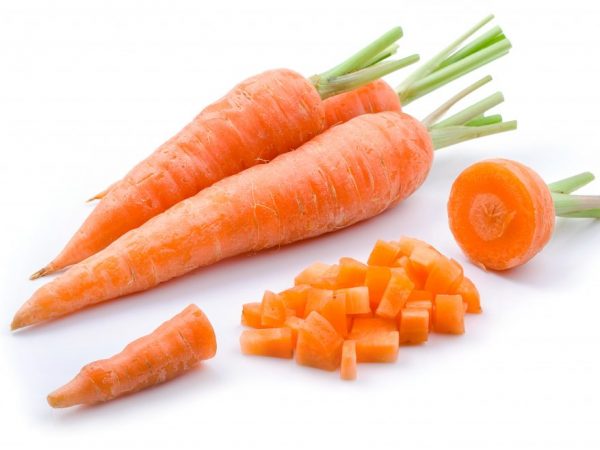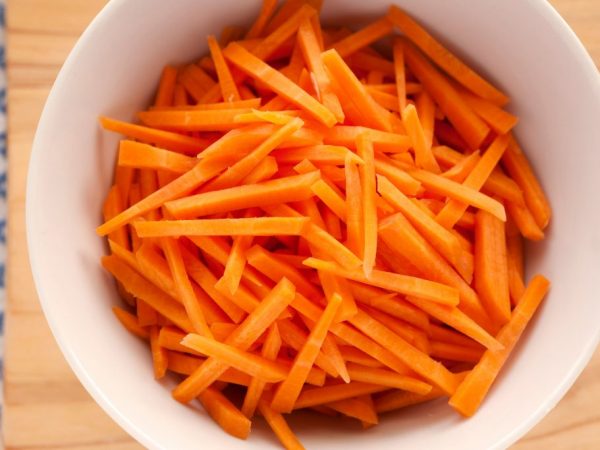Are carrots good for vision?
Nutrition is an important factor in helping to maintain or improve vision. Some foods have a direct impact on health. So, there is a myth that carrots are good for vision. And it's true, it is packed with vitamins and minerals.

The benefits of carrots for vision
Useful properties of carrots
Fragrant, nutritious and juicy vegetable culture is low in calories. Carrots are enriched with:
- a lot of dietary fiber;
- vitamins A, K, C, PP, E;
- sodium;
- potassium;
- manganese.
An orange vegetable contains biologically active components, proteins. Low in fat and cholesterol. 1 carrot per day provides half the daily value of nutrients.
Culture also consists of dietary fiber, which has a positive effect on the body. So, pectin lowers the level of sugar and cholesterol in the blood, slows down the absorption of starch in the body. Thanks to pectin, the vegetable is characterized by a low glycemic index. Carrots are suitable for diabetics and people with high blood sugar levels.
The fiber in the plant contains cellulose, lignin and hemicellulose. Insoluble fiber reduces the risk of diarrhea and constipation. The culture also consists of plant compounds - phytonutrients. There are only 6 of them in carrots:
- Lutein. It has a positive effect on eye health. It is found in both the orange fruit and the yellow one.
- Beta carotene. It is good for the skin and improves the food processes in the stomach. It is included in many drugs.
- Alpha carotene. An antioxidant that protects cells in the body from damage.
- Lycopene. Contained in fruits of red and burgundy shades. It has a positive effect on blood vessels and heart. Reduces the risk of cancer.
- Polyacetylenes. They improve the condition of the blood and reduce the possibility of the development of cancer cells. They are used to prevent leukemia.
- Anthocyanins. They increase immunity, prevent the development of infections. Possess antiviral properties.
Most of the ingredients in carrots are anti-inflammatory and antibacterial.
Carrots and vision benefits
There is a myth that carrots are good for the eyes. Having carried out a large number of studies, experts have proven that improving vision is indeed possible with the use of an orange vegetable. One of the constituent elements of the fetus is beta-carotene, which the human body processes into vitamin A. It maintains the general condition of the visual apparatus.
Vitamin A helps the eyes see in poorly lit areas. A small amount of the vitamin causes cataracts. But with retinal disease, large amounts of beta-carotene only worsen the condition and cause side effects.
The fruit is especially useful for people who are on a diet and their vision is impaired. A healthy person should not overdo it with a dose of root vegetables, since a large amount of vitamin A can be toxic. Carrots do not correct visual defects, they only maintain the general condition of the optical system.
Lutein and zeaxanthin thicken the outside of the retina and add pigment that protects the eyes from light damage. This reduces the risk of macular degeneration on the retina. The potassium and manganese contained in the fetus help the eyeball function.

Carrots do not correct vision defects
By consuming an orange root vegetable daily, age-related visual impairment manifests itself much less:
- fatigue decreases;
- visual acuity increases;
- age-related pathologies decrease.
Fresh carrot juice increases the resistance to degeneration of tissues and cells of the eye. But before taking it, you first need to get rid of the disease, and then, by regeneration, restore cells and tissues.
Dose of carrots to improve vision
Carotene, as a component of carrots, doctors recommend to use regularly. For eye health, the recommended dose is 750 g for 7 days. The raw vegetable is mixed with cream, honey or vegetable oil.
If a person goes in for sports, often sits at a computer or is stressed, the dose is increased to 150 g per day. The amount of the fetus is adjusted individually for your body.
To improve the condition of the eyeball, it is also permissible to boil the root crop for 20 minutes. together with the peel so that it does not lose its beneficial properties. After - use together with nuts, it improves the general condition of the visual apparatus and brain activity.
The most common way to consume carrots is through juice. Nutritionists advise to carry out carrot juice therapy once a year, which lasts 30 days. To do this, drink 500-750 ml of fresh juice every day on an empty stomach. Sweets, bread, pasta are removed from the diet.
Carrot tops for vision
Carrot tops consist of useful acids, vitamins and minerals: vitamins B1, B2, B3, B4, B5, D, E, iodine, iron, magnesium and sodium.
The foliage is also used during diets. Greens are crushed and added to dishes as a seasoning. To rid the aerial part of the plant from the bitter aftertaste, 15 minutes. kept in boiling water. Carrot tops cure some diseases:
- allergies;
- avitaminosis;
- hypertension;
- urolithiasis;
- pathology of the digestive tract.
But it is important to choose the dose of your greens to avoid side effects. The aboveground part of the culture also copes well with visual impairment. While the carrot fruit only maintains eye health or protects, the foliage restores and maintains vision. Its addition to the diet helps to cope with myopia and hyperopia.
Daily addition of chopped tops to food helps to improve the condition of the visual apparatus. The greens of the crop contain 6 times more vitamin C than the fruit. If you eat the dish along with the tops, it will speed up digestion.
Conclusion
The benefits of carrots lie in their medicinal properties for the eyes and digestion. The fruit of carrots does not cure myopia and hyperopia, but the foliage helps to prevent eye diseases. To improve vision, it is recommended to eat 200 g of the fruit 3 times a week and add its aerial part to cooked food.


